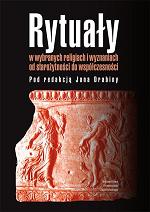Z badań nad neoplatońską interpretacją rytuału teurgicznego (De mysteriis Jamblicha) - wokół zagadnienia działania
Studies in the Neoplatonic Interpretation of the Theurgic Ritual (Iamblichus' De mysteriis); Some Remarks on the Problem of Action
Author(s): Daria Szymańska-KutaSubject(s): Christian Theology and Religion
Published by: Wydawnictwo Uniwersytetu Jagiellońskiego
Keywords: study of religions; history of religions; comparative study of religions; phenomenology of religion; anthropology of religion; sociology of religion; psychology of religion; philosophy of religion; religious beliefs and behaviours; theories and methods of
Summary/Abstract: Deriving the etymology of the term theourgia, which is probably made up of the words „god” (theos) and „work” (ergon), the article attempts to explain the role played in theurgy by „work”. The author asks a question about what, and, more importantly, whose action it is that is meant in theurgy and investigates three possible answers: acting on the gods, the gods’ actions, and creating the gods. The analysis is based on a Neoplatonic interpretation of the theurgic ritual as shown in De mysteriis, where Iamblichus questions Porphyry’s view in which theurgists claim a right to infl uence the gods. The article investigates the concept of theurgic ritual which Iamblichus formulated in response to Porphyry’s accusations. The author concentrates on Iamblichus’ main point which is that active in theurgy is not man, but the gods, who take control over ritual and use it as an instrument to infl uence men in order to enable them to achieve salvation. She also examines the meaning of ritual techniques performed by men as she addresses invocations intoned by the priest which served as a technique of attainment divine condition.
Journal: Studia Religiologica. Zeszyty Naukowe Uniwersytetu Jagiellońskiego
- Issue Year: 2009
- Issue No: 42
- Page Range: 51-65
- Page Count: 15
- Language: Polish

